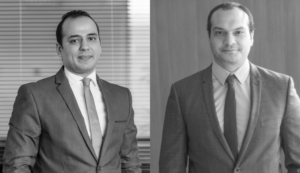W
Frederic Soliman: I believe that the biggest two (2) challenges facing the Egyptian legal market in the next 12 months will be mainly the impact of the Egyptian Pound’s devaluation vs USD and recruitment.
Do you consider sustainability credentials important to your firm’s business?
Mohamed Hashish: Yes, for sure that’s why our firm is the only law firm in Egypt that participated in the foundation of the Global Compact Egypt Network, which is the official business-led network of the United Nations Global Compact (“UNGC”) where I am proud of being acting as Secretary General/Board member.
Have ESG considerations prompted you to re-evaluate the service you provide?
Mohamed Hashish: We started our law firm from scratch based on the ten principles of the UNGC and we decided to exclusively represent only large corporations that are also committed to these principles aiming at maintaining the highest quality legal services that our respected clients are looking for.
Where do you feel your clients need the most legal support in the next 12 months?
Frederic Soliman: We believe that our clients will likely need legal support within the practice areas of corporate governance, labour law, financing, litigation and restructuring.
What sets your firm apart from competitors?
Frederic Soliman: We committed ourselves to the top business ethics and international standards and be practical business lawyers, responsiveness, to the point, providing legal solutions, alternatives and always accessible.
Are there specific practice areas you see as particularly thriving, which you intend to bolster in coming years? Are there any new areas of practice that have emerged recently?
Frederic Soliman and Mohamed Hashish: Projects developments, M&As, restructuring and litigation are in our opinion particularly thriving while fintech, greenfield investment and capital market have recently emerged.
How active are members of your team in terms of thought leadership?
Mohamed Hashish: We train our team daily and expose them to different experiences and leadership roles to build up new real leaders.
What are your firm’s policies on diversity and inclusion? Does your firm have any specific diversity initiatives?
Mohamed Hashish: We do have our law firm a detailed policy for diversity and inclusion that is aligned with the Egyptian laws and culture.
What does innovation mean to you? Can you tell us about any specific innovation initiatives at your firm?
Mohamed Hashish: We believe in Thomas Jefferson’s saying, “if you want something you’ve never had. You must be willing to do something you’ve never done”. This exactly what innovation means to us. We have been doing our best efforts since the establishment of our law firm not only to keep developing our firm but also the entire practice in Egypt. We have been working on multiple products in collaboration with multiple international players since a while that will be announced soon in Egypt, which products will be the first of their kinds within the region.
What technological changes have you implemented at your firm to improve the legal services you provide to your clients?
Mohamed Hashish: We use the best available technology to keep increasing the efficiency and performance at our law firm and provide our clients with the desired quality of legal services.
With more boutique firms springing up in the Egyptian legal market and international firms expanding to the MENA region, what do you think the challenges will be that the established national players will face in light of a changing legal landscape?
Frederic Soliman and Mohamed Hashish: Locating the real good lawyers along with the ethical competition are on top of all challenges we have in Egypt.
As the first sovereign in the MENA region to issue a green bond, how would you assess the potential and challenges for green finance in Egypt?
Mohamed Hashish: Egypt is a very attractive market, especially when it comes to finance (including green finance). Due to the hard work of the government in the past few years in improving the business environment in the country, Egypt managed to attract more foreign direct investment (FDI) in multiple sectors, including mainly the financial services sector. The banking sector in Egypt can be generally described as Bloomberg well-said that ‘a profit bonanza for Egyptian banks is ripening the industry for acquisitions. If only there were more willing sellers.’
Have there been any areas of practice in your firm that have been particularly affected by the end of the State of Emergency in October 2021?
Mohamed Hashish: Ending the State of Emergency is for sure a good step but it does not really affect our specific areas of practice.